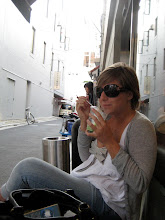
Peter Cook is a well known British architect as well as a teacher and writer. He was one of the founding members of Archigram, described by the ABC as "one of the most revolutionary but strangest architectural collectives the world has ever seen.". He has always been well known for his bizarre concepts and out of this world ideas which he focused on for many years. It has been more recently, in the latter part of his career that he has actually built such space aged designs. The Kundsthaus Graz, or Graz Art Museum being an example. His newest addition will be the London Olympic Stadium, to be complete for 2012.
 Graz Art Museum, Austria
Graz Art Museum, AustriaWhere I find inspiration in his work and his thinking is in the way he understands the city as a multi layered complex collection of spaces. He believes there is a need to create cityscapes that comprise of these 'layers', this 'non-solid architecture'; incidence, nooks, corners and overlays with plenty of relative space in between.
This is what I believe planning has evolved far from, to the modern urbanism of organization, seperation and distancing of activities and social groups. Planners need to think about what a city could be, and how the people who live in it might respond, and with this thinking more functional, sustainable cities can emerge.
Brisbane was lucky enough to host Peter Cook last week. He was there to present the Neilson Design Lecture at the State Library of Queensland as part of Design Week.
"There are lots of clever people at universities and they can make very smart ideas, but they don't come up with anything." -Peter Cook
...lets work on this..
M.

Wonderful post, I love the final quote. Throughout your posts I find a passion and enthusiasm I wish most current urban designers possessed. Have you considered posting your own work?
ReplyDeleteThank you Dana, I really appreciate your comment. Are you an urban designer? Do you blog?
ReplyDeleteNope, just someone appreciative of the effect the environment has on our day to day lives. Sorry don't blog yet.
ReplyDelete